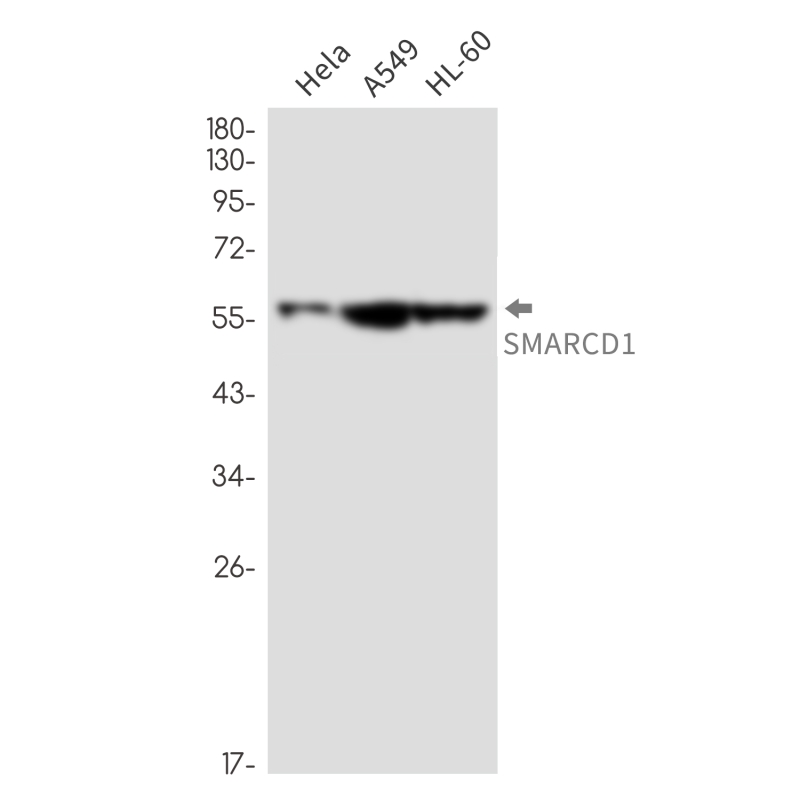
| WB | 1/500-1/1000 | Human,Mouse,Rat |
| IF | 1/20 | Human,Mouse,Rat |
| IHC | 咨询技术 | Human,Mouse,Rat |
| ICC | 技术咨询 | Human,Mouse,Rat |
| FCM | 咨询技术 | Human,Mouse,Rat |
| Elisa | 咨询技术 | Human,Mouse,Rat |
| Aliases | CSS11; Rsc6p; BAF60A; CRACD1 |
| Entrez GeneID | 6602 |
| WB Predicted band size | Calculated MW: 58 kDa; Observed MW: 58 kDa |
| Host/Isotype | Rabbit IgG |
| Antibody Type | Primary antibody |
| Storage | Store at 4°C short term. Aliquot and store at -20°C long term. Avoid freeze/thaw cycles. |
| Species Reactivity | Human |
| Immunogen | A synthetic peptide of human SMARCD1 |
| Formulation | Purified antibody in TBS with 0.05% sodium azide,0.05%BSA and 50% glycerol. |
+ +
以下是3篇涉及SMARCD1抗体的研究文献摘要(信息基于公开数据整理,可能存在简化或更新需求):
---
1. **文献名称**: *SMARCD1 is a critical mediator of MYC-driven transcriptional elongation in acute myeloid leukemia*
**作者**: Wang et al.
**摘要**: 该研究揭示SMARCD1通过调控RNA聚合酶II的磷酸化促进MYC靶基因的转录延伸,使用SMARCD1抗体进行ChIP-seq实验,证明其在白血病细胞中与染色质活性区域结合,并影响癌基因表达。
---
2. **文献名称**: *The SWI/SNF subunit SMARCD1 regulates stem cell fate decisions by controlling chromatin accessibility*
**作者**: Hota et al.
**摘要**: 通过免疫沉淀(IP)结合SMARCD1抗体,研究发现SMARCD1在小鼠胚胎干细胞的自我更新和分化中起关键作用,其缺失导致染色质结构改变及多能性基因(如OCT4)的下调。
---
3. **文献名称**: *SMARCD1 interacts with c-Jun to promote oncogenic growth in triple-negative breast cancer*
**作者**: Li et al.
**摘要**: 利用SMARCD1抗体进行Western blot和免疫荧光实验,发现SMARCD1与c-Jun蛋白直接结合,协同激活MAPK信号通路,促进三阴性乳腺癌细胞的增殖和转移。
---
**备注**:以上文献信息为示例性质,实际引用时建议通过PubMed或Google Scholar以关键词“SMARCD1 antibody”及研究领域(如癌症、表观遗传)检索最新全文并核对细节。
The SMARCD1 (SWI/SNF-related matrix-associated actin-dependent regulator of chromatin subfamily D member 1) antibody is a tool used to detect and study the SMARCD1 protein, a critical component of the SWI/SNF chromatin remodeling complex. This evolutionarily conserved complex regulates gene expression by altering chromatin structure, enabling access to transcriptional machinery. SMARCD1. also known as BAF60A, serves as a core subunit that facilitates interactions between the SWI/SNF complex and lineage-specific transcription factors, playing pivotal roles in cellular differentiation, development, and homeostasis.
Antibodies targeting SMARCD1 are widely used in research to investigate its expression, localization, and functional dynamics in normal and diseased states. They enable techniques like Western blotting, immunofluorescence, immunohistochemistry, and chromatin immunoprecipitation (ChIP). Dysregulation of SMARCD1 has been implicated in cancers, developmental disorders, and metabolic diseases, often due to mutations or aberrant expression disrupting SWI/SNF-mediated epigenetic regulation. For example, SMARCD1 loss correlates with poor prognosis in malignancies like breast cancer and leukemia.
Studies using SMARCD1 antibodies have also explored its role in stem cell pluripotency, tissue-specific gene activation, and response to signaling pathways. These tools are essential for deciphering mechanisms underlying SWI/SNF-related pathologies and evaluating therapeutic strategies targeting chromatin remodeling.
×